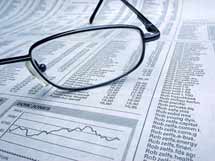
There are increasing signs that a housing slump may become the leading factor in pushing the United States economy into a recession. The impact of lower housing starts and the large inventory of unsold homes garner the bulk of the attention at the moment, but should the slowdown continue the focus may well shift to lending practices that may well accelerate the economic impact of a housing slump. Specifically, it appears that the number of loans that are either interest only, adjustable rate, or funded at full value or in some instances at 125% may trigger an unprecedented wave of foreclosures and bankruptcies as well as sharp declines in consumer spending. An article by the Christian Science Monitor provides the latest update on state of the housing industry.
In some markets, buyers have gone missing — glued to their money in the expectation that home prices will fall. Desperate, sellers and developers are trying to sweeten their deals to unload McMansions and houses built on speculation. Now comes the news that new construction on homes has fallen so sharply that some economists use the "R" word when they talk about the housing market — and warn about what that might mean for the economy as a whole.
"Housing's in a recession; there are no two ways about it," says Paul Kasriel, chief economist at Northern Trust Co. in Chicago. "Typically when we get declines in housing of this magnitude, with a lag, the economy goes into recession. There have been exceptions, but not many."
Tuesday gave economists more cause for concern. The government reported new home starts fell 6 percent in August compared with July.
New home construction is now down about 20 percent compared with last year. There are seven months of unsold homes waiting for buyers — a record number.
The decision by the Federal Reserve to forego another increase in interest rates seems to signal concern that the housing slump has the potential to push the economy towards recession. Further, the pause in rate increases comes at a time when the Federal Reserve has felt the increases were needed to stem concerns about rising inflation. Nonetheless, the decision to keep rates steady is significant.
"Housing is a big worry for the Fed," says Scott Brown, chief economist at Raymond James & Associates in St. Petersburg, Fla. "At the start of the year they expected an orderly decline, but this summer the market started to fall apart."
Despite these numbers, some economists are predicting the housing market will start to stabilize. David Wyss, chief economist at Standard & Poor's, is forecasting new housing construction will fall 25 percent from 2005 levels. He expects some overly hot markets will see prices fall. Nationally, he anticipates home prices will flatten out.
"We're in the stage now where people are beginning to lower their price or take what they can," he says. "The third stage wrings out the excesses. A year from now will be the best time to buy."
It remains to be seen if the slowdown will be manageable or if recent changes in lending practices will alter what some economists are optimistically predicting will be a soft landing. In my opinion, gauging the impact of this housing slump cannot be garnered from previous historic data in light of these changing loan profiles.
Daniel DiRito | September 21, 2006 | 9:15 AM |
link
| Comments (0)



Despite recent gains on Wall Street, there is a growing group of economists and financial managers that worry we may be headed towards a recession. These fears are being driven by the recent data and burgeoning uncertainty surrounding the housing industry. BusinessWeek has the details in an article that can be found here.
Despite Wall Street's high spirits, a voluble minority of economists continues to warn of a coming recession, possibly arriving as early as this year. The slowing housing market, an inverted Treasury yield curve, and lingering inflationary pressures could mean the U.S. economy is in for a hard landing, some economists say.
On Sept. 15, Morgan Stanley (MS) economists acknowledged a "vigorous" internal debate over the recession threat. "We all agree that the U.S. housing downturn has escalated recession risks," says Richard Berner, Morgan Stanley's chief U.S. economist. "But the argument over how much collateral damage will result and the nature of the offsets to U.S. housing weakness is far from settled."
Economists have a poor track record for predicting recessions. According to The Economist, 95% of economists in March, 2001, thought a recession would not occur that year, though one actually began the same month. "Professional forecasters…are always way overoptimistic and systematically miss the turn downward of the business cycle," notes New York University economist Nouriel Roubini, who pegs the odds of a recession in 2006 at 70%.
The cooling housing market is a key impetus behind many recession fears. Recent years of consumers tapping home equity to make purchases could give way to a consumer-spending slowdown, according to some analysts.
"As we've said before, it is a case of when, not whether, falling consumption will precipitate the next downturn," says U.S. Bank (USB) economist Tucker Hart Adams, who sees a 75% chance of recession before the end of 2007.
Given recent reports on the quantity of home loans with unfavorable terms and insufficient equity, it seems more likely that any significant issues with housing sales or pricing could have inordinately negative economic consequences. There are reports from a number of markets that sales have stalled and that prices are beginning to decline. Should that trend expand nationwide, the impact could be devastating.
Even economists who project continued economic expansion have found the housing weakness unsettling. "The dramatic softening of the housing market has increased the probability of recession in 2007 to one-third," says Larry Adam, chief investment strategist for Deutsche Bank Alex. Brown (DB). The International Monetary Fund cited the housing slump Sept. 14 as it trimmed its forecast for 2007 U.S. economic growth.
Elsewhere, the inverted Treasury yield curve has added fuel to the pessimistic fire. An inverted yield curve occurs when long-term rates drop below short-term rates. Since 1970, every time the yield curve has inverted, a recession has followed.
This historical precedent bodes poorly for corporate profits, some analysts say. "Earnings expectations for 2007 are probably too optimistic," says Richard Bernstein, chief investment strategist at Merrill Lynch (MER), in a Sept. 7 report. "A profits recession is reasonably likely around mid-to-late 2007."
Still, most economists forecast that economic growth will slow without slipping into recession. The chances for a soft landing are better than they might seem, according to Standard & Poor's Investment Policy Committee.
Nevertheless, the bearish views are worth keeping in mind, even when market gains make them all the more tempting to ignore. While a recession may not lurk on the horizon, investors shouldn't let a surprising September blind them to the risks.
As we approach the November midterm election, it seems the Democrats could benefit from citing the potential for recession...especially if gas prices continue to decline...a trend that could help Republicans bolster their assertions that the economy is strong. Recent surveys indicate that the recent economic growth has not translated into noticeable benefits for most working class Americans...a further reason for Democrats to make economic uncertainty a key issue in the next few weeks.
Daniel DiRito | September 18, 2006 | 8:56 PM |
link
| Comments (1)



Two recent polls now show that Americans see the economy as the most important issue facing the country as they move towards deciding how to vote in November. The Economy has surpassed the war in Iraq and the war on terrorism...and when combined they may make for an anti-incumbent sentiment rarely witnessed. November may find Americans even angrier if the downward trends persist in the housing industry.
From The Washington Post:
Flat wages and rising debt nationally have converged to leave millions of middle-class households feeling acutely vulnerable to bumps in their financial planning. The most visible of these are rising energy prices and a softening housing market.
A less obvious but powerful variable is the interest paid by people carrying credit card debt or mortgages whose monthly payments vary with interest rates. People buffeted by these trends have given rise to a new and volatile voting block.
"People like this are making a large ripple across the body politic," said Republican pollster Bill McInturff of Public Opinion Strategies. When added to the growing opposition to the war in Iraq, he said, worry about this economic crunch "is creating a political environment that is not that friendly to the party in power."
This year could mark the emergence of what might be called mortgage moms -- voters whose sense of well-being is freighted with anxiety about their families' financial squeeze. Democrats are betting that this factor is strong enough to trump security or cultural values issues.
If soccer, security, and now mortgage moms are all angry; someone better look out. While the GOP plans to invoke national security and the fear of terrorism, issues that worked well in 2002 and 2004, it is hard to imagine they would be sufficient to overcome what holds the most weight with moms, the economic security of their own families.
According to a recent survey by Bloomberg News and the Los Angeles Times, six in 10 self-described independents said the economy was doing badly, and seven in 10 said the country was on the wrong track. A Fox News poll, taken at the end of last month, showed that 23 percent of Americans consider the economy the most important factor they will weigh when they cast their ballots in November -- more than those who cited Iraq (14 percent) or terrorism (12 percent).
Then there is debt. According to a study by the Federal Reserve Board, the ratio of financial obligations -- primarily mortgage and consumer debt -- to disposable personal income rose to a modern record of 18.7 percent earlier this year. The amount of mortgage debt alone has more than doubled since 2000, to nearly $9 trillion. And in July, for the 16th consecutive month, consumers in the aggregate spent all of their disposable income and dipped into savings or borrowed to finance the things they bought.
Among the most exposed are those who bought into one of the great fads in mortgage lending in recent years -- adjustable rates. Next year, $1 trillion worth of adjustable-rate mortgages -- about 11 percent of all outstanding mortgage debt -- is scheduled to readjust to a higher interest rate for the first time, according to LoanPerformance, a research company. This will come after more than $400 billion of readjustments this year. That means millions of homeowners will either have to refinance or shoulder an increase of perhaps 25 percent in their monthly payments.
This data supports the anecdotal observations previously made here at Thought Theater and may well be the beginning of the modern day version of the Savings and Loan scandal of the late 1980's.
From CNN:
WASHINGTON (CNN) -- Most Americans are angry about "something" when it comes to how the country is run, and they are more likely than in previous years to vote for a challenger this November, a new poll suggests.
A majority -- 55 percent -- said they are more likely to back a challenger in races on this year's ballot. Such anti-incumbent sentiment is higher than the 48 percent recorded as "pro-challenger" in a similar survey in 1994, when the GOP took control of both houses of Congress.
More than 60 percent of those surveyed said government policies need either major changes or a complete overhaul, while 30 percent said minor changes were needed. Only 7 percent said no change is necessary.
The economy topped the list of respondents' concerns, with 28 percent calling it the most important issue when deciding how to cast their ballots. Coming second was Iraq at 25 percent, followed by terrorism (18 percent), moral issues (15 percent) and immigration (14 percent).
Democrats lead Republicans by a 10-point margin, 53 to 43 percent, among likely voters asked which party's congressional candidate they would support in November, and Democrats held a 56-40 lead on the same question among registered voters.
It is somewhat surprising how quickly the economy has become a key issue in this upcoming election. Just a couple of months back, a number of GOP strategists were urging the President and the Party to begin to showcase the economic successes of the last five years. Unfortunately, the data that measures the economy's benefits to average wage earners provided a bleak picture and seems to explain why the GOP was never able to gain traction with the issue.
Daniel DiRito | September 4, 2006 | 9:42 PM |
link
| Comments (0)



![]()
![]()

